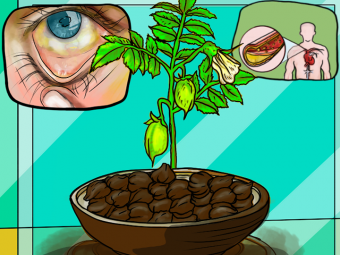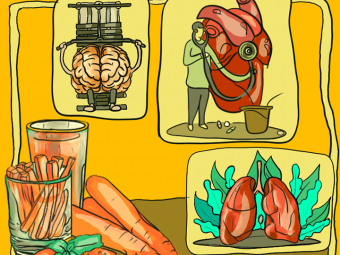Parsnips are root vegetables with a rich nutritional profile. They have been cultivated around the world for centuries and are closely related to carrots. Parsnips benefits can be attributed to their rich nutrition profile. This root veggie can help boost your heart health, prevent birth defects, improve digestion, and enhance immune system function. This article explores the health benefits of parsnips, their nutrition profile, recipes, and potential side effects. Keep reading.
In This Article
How Are Parsnips Good For You?
Parsnips carry a striking resemblance to carrots, and the only way to differentiate them from carrots is their lighter hue (while carrots are a darker orange). A raw parsnip tastes somewhere between a carrot and a potato. It smells like fresh parsley.
The goodness of parsnips, like any other food, comes from their impressive nutrition profile. They contain potassium that boosts heart health, and folate that prevents congenital disabilities in newborns. Parsnips are also an excellent source of fiber and do everything that fiber does – enhance digestion, promote eye health, and regulate blood pressure levels.
We shall look at the extensive nutrition profile of parsnip in a while. But first, let’s check out the benefits this wonder root veggie has to offer.
How Can Parsnips Benefit Your Health?
1. Can Boost Heart Health
Parsnips are great sources of potassium, a mineral found to have great benefits for the heart. Adequate potassium intake is also important for the prevention of stroke and coronary heart disease (1).
Studies also show that increasing potassium intake can decrease heart disease risk by 17% and increase life expectancy by over 5 years.
Low potassium intake has also been identified as a risk factor for hypertension (2). As parsnips contain this mineral in abundance, consuming them can help regulate blood pressure levels – and eventually avert heart disease.
The soluble fiber in parsnips can help fight heart disease as it can lower LDL cholesterol levels.
2. Prevent Birth Defects

Shutterstock
Parsnips are good sources of folate too, an important nutrient that helps prevent birth defects in newborns.
Certain studies show that folic acid (or folate) can cut the risk of birth defects of the spinal cord and the brain by as much as 70% (3). The most dangerous of these birth defects is spina bifida, wherein the baby is born with a part of the spinal cord outside the body.
3. Can Boost Digestion
The presence of soluble fiber makes parsnip an ideal food for banishing your digestion troubles. Soluble fiber helps by cutting the risk of constipation as it retains water and turns into a gel during digestion (4).
4. Can Improve Immunity
Parsnips are rich in vitamin C, a nutrient that helps boost immunity (5). Studies show that vitamin C enhances the immune system – its deficiency has been associated with impaired immunity. Vitamin C is also important in collagen synthesis, thus being a vital nutrient for healthy skin, hair, and nails.
Supplementation with vitamin C was also found to treat systemic and respiratory infections (6).
5. May Fight Anemia
Parsnips are rich in folate – and studies show that treatment with folate can help fight megaloblastic anemia (7).
These are the ways adding parsnips to your diet can do you a whole lot of good. As we discussed, all of this can be attributed to the nutritional profile of the root vegetable.
What Is The Nutritional Profile Of Parsnips?
| Calorie Information | ||
|---|---|---|
| Amounts Per Selected Serving | %DV | |
| Calories | 99.7(417 kJ) | 5% |
| From Carbohydrate | 92.0(385 kJ) | |
| From Fat | 3.3(13.8 kJ) | |
| From Protein | 4.4(18.4 kJ) | |
| From Alcohol | ~(0.0 kJ) | |
| Carbohydrates | ||
| Amounts Per Selected Serving | %DV | |
| Total Carbohydrate | 23.9 g | 8% |
| Dietary Fiber | 6.5 g | 26% |
| Starch | ~ | |
| Sugars | 6.4 g | |
| Protein & Amino Acids | ||
| Amounts Per Selected Serving | %DV | |
| Protein | 1.6 g | 3% |
| Vitamins | ||
| Amounts Per Selected Serving | %DV | |
| Vitamin A | 0.0 IU | 0% |
| Vitamin C | 22.6 mg | 38% |
| Vitamin D | ~ | ~ |
| Vitamin E (Alpha Tocopherol) | 2.0 mg | 10% |
| Vitamin K | 29.9 mcg | 37% |
| Thiamin | 0.1 mg | 8% |
| Riboflavin | 0.1mg | 4% |
| Niacin | 0.9 mg | 5% |
| Vitamin B6 | 0.1 mg | 6% |
| Folate | 89.1 mcg | 22% |
| Vitamin B12 | 0.0 mcg | 0% |
| Pantothenic Acid | 0.8 mg | 8% |
| Choline | ~ | |
| Betaine | ~ | |
| Minerals | ||
| Amounts Per Selected Serving | %DV | |
| Calcium | 47.9 mg | 5% |
| Iron | 0.8 mg | 4% |
| Magnesium | 38.6mg | 10% |
| Phosphorus | 94.4 mg | 9% |
| Potassium | 499 mg | 14% |
| Sodium | 13.3 mg | 1% |
| Zinc | 0.8 mg | 5% |
| Copper | 0.2 mg | 8% |
| Manganese | 0.7 mg | 37% |
| Selenium | 2.4 mcg | 3% |
| Fluoride | ~ | |
Source: USDA Food Composition Databases
With such an amazing nutrition profile, who wouldn’t want to make parsnips a part of their daily diet? Check out the recipes in the next section.
Parsnip Recipes
1. Parsnip Puree
Ingredients
- 1 pound of thinly sliced parsnips
- ½ cup of heavy cream
- ½ cup of 2% milk (may use whole milk)
- 2 thinly sliced garlic cloves
- 2 tablespoons of unsalted butter
- Kosher salt
How To Prepare
- Bring the parsnips, cream, milk, garlic, and the butter to a boil in a medium saucepan.
- Reduce heat, cover, and simmer until the parsnips turn very soft. This might take about 10 to 15 minutes.
- Uncover and keep cooking until the liquid is reduced by half. This may take about 5 minutes.
- Season with salt and puree in a blender until you get a smooth mixture.
2. Butter Fried Parsnips
Ingredients
- 6 peeled parsnips, quartered lengthwise
- ½ teaspoon of seasoning salt
- ½ cup of melted organic butter
- ¼ cup of all-purpose coating
How To Prepare
- Cover the parsnips in water in a large saucepan. Boil over medium-high heat for about 10 minutes until tender. Drain the water.
- Combine the flour and seasoning salt in a plastic bag. Dip the parsnips in the butter and place them in the bag. Shake the bag to coat the parsnips with the seasoned flour.
- In a large skillet over medium-high heat, heat the butter. As the butter sizzles, add parsnips.
- Keep cooking, turning occasionally, until all sides turn golden brown.
Absolutely delectable dishes, aren’t they? Quite simple to prepare and extravagantly nutritious too! We are sure you can’t wait to head to your kitchen right away. But hold on – there is something else about parsnips you’ve got to know.
Do Parsnips Have Any Side Effects?
Parsnips may cause allergies in certain individuals. Such people may also experience contact dermatitis. Rashes or a burning sensation on the lips, mouth, and throat are some of the possible side effects. If you experience any of these effects, please stop consuming it and visit your doctor.
Avoid parsnip leaves. Just stick to the root. The leaves can cause skin blistering.
Avoid wild parsnips. These are found in open areas, fields, and pastures. They have yellowish-green flowers appearing in umbrella-shaped clusters, usually in June and July. Please avoid them at all costs as they are toxic. Livestock eating wild parsnips were found to experience negative effects on their fertility and weight (8).
Subscribe
Parsnips are delicious root vegetables with a rich nutritional profile. They are rich in dietary fiber and vitamin C, which help treat many ailments. Parsnips benefit your health in many ways. They may boost heart health, prevent congenital disabilities, improve digestion, promote immune health, and fight anemia. You can prepare many simple recipes with parsnips at home easily. However, they may cause rashes and blisters and negatively affect fertility and body weight in some individuals. Hence, consume them in moderation and consult your doctor if you experience any emergencies.
Frequently Asked Questions
What is a substitute for parsnips?
You may substitute parsnips with carrots. You can also substitute them with other root veggies like turnips.
Can you eat parsnips raw?
Yes, they can be eaten raw – though it is not quite common. The best way to eat them is cooked.
Key Takeaways
- Parsnip, a root vegetable, is a source of fiber and contains potassium and folate.
- This vegetable can help boost your heart health, prevent birth defects, improve digestion, and enhance immune system function.
- Parsnips may cause allergies in some people, with common symptoms being rashes or a burning sensation on the lips, mouth, and throat.
References
- “Potassium and health” Advances in Nutrition, US National Library of Medicine.
- “Heart disease and stroke statistics” American Heart Association.
- “Folic acid: the vitamin that helps prevent…” New York State Department of Health.
- “Soluble and insoluble fiber” US National Library of Medicine.
- “Roasted parsnip celeriac soup” Bastyr University.
- “Vitamin C and immune function” Nutrients, US National Library of Medicine.
- “Folate and disease prevention” Scientific Advisory Committee on Nutrition.
- “Wild parsnip” Michigan Invasive Species.
Related
The following two tabs change content below.
- Author
- Reviewer

Ravi Teja Tadimalla
Ravi Teja Tadimalla is an editor and a published author. He has been in the digital media field for over… more
Elisa Olivier-Nielsen
(MA, RDN)Situated in Northern Arizona, Elisa Olivier-Nielsen’s private practice offers both in-office and virtual consultations nationwide. As a Registered Dietitian Nutritionist… more



 29 Amazing Benefits Of Figs For Skin, Hair And Health
29 Amazing Benefits Of Figs For Skin, Hair And Health 19 Amazing Benefits Of Black Chickpeas (Kala Chana) For Skin, Hair And Health
19 Amazing Benefits Of Black Chickpeas (Kala Chana) For Skin, Hair And Health 28 Best Shea Butter Benefits For Skin, Hair And Health
28 Best Shea Butter Benefits For Skin, Hair And Health 15 Best Benefits Of Beta Carotene For Skin, Hair And Health
15 Best Benefits Of Beta Carotene For Skin, Hair And Health 29 Amazing Benefits Of Sesame Seeds For Skin And Health
29 Amazing Benefits Of Sesame Seeds For Skin And Health 4 Reasons Goat Cheese Is Better Than Cow Cheese
4 Reasons Goat Cheese Is Better Than Cow Cheese 38 Benefits Of Lime For Skin, Hair, And Health + Nutrition
38 Benefits Of Lime For Skin, Hair, And Health + Nutrition Rice Water For Skin – How To Use It For Maximum Benefits
Rice Water For Skin – How To Use It For Maximum Benefits 9 Benefits Of Cranberry Tea For Health And Recipes To Try
9 Benefits Of Cranberry Tea For Health And Recipes To Try